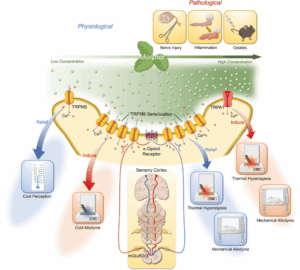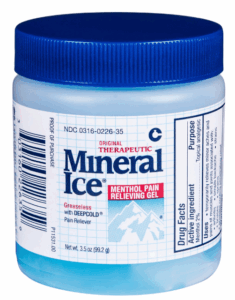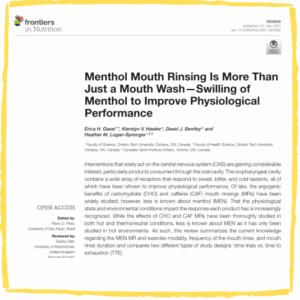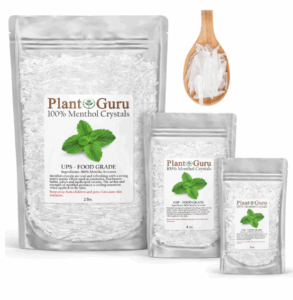If you’re a solo athlete grinding through miles in the summer heat – whether you’re trail running, cycling, doing jiu-jitsu in a packed gym, or climbing steep ridgelines under the sun – you already know the toll heat takes. Fatigue creeps in faster, every breath feels heavier, and your performance slips just when you need it most. Now imagine there was a simple way to feel cooler, push longer, and suffer less. That’s where menthol comes in – not just as a minty freshener, but as a legit performance enhancer rooted in neuroscience.
Menthol isn’t just flavoring for your gum or a chest rub for cold season. It’s being explored as an ergogenic aid that can actually improve athletic output in hot conditions, without changing your body temperature at all.
What Is Menthol, and Why Should Athletes Care?
Menthol is a naturally occurring compound found in mint plants like peppermint. When you eat or apply something with menthol, it stimulates receptors in your body that make you feel cold. Specifically, it activates TRPM8 ion channels – also called “cold receptors” – found in your skin and mucous membranes. These receptors respond to temperature changes between 8–28°C, and menthol tricks them into thinking you’re exposed to cold, even when you’re not.
like peppermint. When you eat or apply something with menthol, it stimulates receptors in your body that make you feel cold. Specifically, it activates TRPM8 ion channels – also called “cold receptors” – found in your skin and mucous membranes. These receptors respond to temperature changes between 8–28°C, and menthol tricks them into thinking you’re exposed to cold, even when you’re not.
This matters because the feeling of being cooler can reduce your perceived exertion, allowing you to push longer and harder in hot conditions. You might not actually be cooler, but if you feel like you are, you’re less likely to slow down due to heat fatigue.
Perception vs. Physiology: The Menthol Illusion
One of the most interesting findings from recent research, including research done for the Tokyo 2021 Olympics, is that menthol works not by lowering your core temperature, but by changing how hot you feel. That’s a powerful distinction.
This is especially relevant in endurance and solo sports where mental stamina plays a huge role. By lowering your thermal sensation (how hot you feel) and thermal discomfort (how much the heat bothers you), menthol can trick your brain into letting you maintain a higher intensity for longer.
In short, menthol doesn’t cool you down, but it does make your brain think it does. And for endurance athletes, that can be enough to gain a critical edge.
How Athletes Are Using Menthol
Oral Rinses and Ingestion
The most effective and safest form of menthol use appears to be mouth rinsing. In studies, athletes swishing a solution of about 0.01–0.1% L-menthol in water every 10–15 minutes during exercise showed improved time to exhaustion, better thermal comfort, and up to 6% improvement in time trial performance.
You don’t even need to swallow the rinse – the cooling sensation in your mouth is enough to trigger the perceptual effects. Some sports scientists are experimenting with menthol-infused ice slushies or energy gels, but those are less accessible to the average athlete right now.
Topical Application
Topical menthol – typically sprays, gels, or creams – can also be applied to key areas of the body like the neck, chest, or face. These zones are rich in thermoreceptors and have been shown to produce the strongest cooling sensations.
to key areas of the body like the neck, chest, or face. These zones are rich in thermoreceptors and have been shown to produce the strongest cooling sensations.
That said, high concentrations (above 8%) or full-body application may suppress sweating, which could actually increase core temperature. So use with caution – especially in longer or hotter events where you rely on sweat to cool off.
Everyday Sources
For the everyday independent athlete, menthol can be found in:
- Mint gum or lozenges
- Peppermint tea or cordial
- Over-the-counter cooling creams (read labels for menthol percentage)
- DIY mouth rinses (see recipe below)
These options make menthol an easy addition to your training toolkit, especially for athletes on a budget or without access to fancy cooling gear.
What the Research Says: Not Just Placebo
 You might be wondering if menthol is just a glorified placebo?
You might be wondering if menthol is just a glorified placebo?
Not exactly. While the mechanism is perceptual (meaning it changes how you feel, not your core body state), it’s consistent, measurable, and repeatable in lab conditions. A 2020 consensus paper involving researchers from Olympic training teams concluded that both (especially in events over 2.5 minutes)
- Reduce perceived exertion
- Enhance thermal comfort
- Work best in trained male athletes, but are being studied in wider populations
Importantly, menthol use does not violate the “spirit of sport,” nor is it banned by anti-doping agencies. It’s legal, accessible, and effective, making it a perfect tool for self-reliant solo athletes looking for safe edges.
Best Use Cases for Menthol
Menthol is particularly useful when:
- You’re training or racing in hot or humid environments
- You’re doing endurance activities like distance running, cycling, or hiking
- You need a mental edge to push past heat-related fatigue
However, menthol is less proven for:
- Strength training or power sports (like Olympic lifting or CrossFit)
- Short bursts of activity or cold-weather conditions
- Female athletes, due to limited research on gender-specific effects
That said, it’s safe to experiment with low doses in training. Just don’t expect miracles – and, of course, don’t neglect basics like hydration and heat acclimation.
Risks and Limitations
Menthol is generally safe at low doses, but there are important caveats:
- Too much topical menthol (>8-10%) can cause skin irritation or burning
- Overuse in hot conditions may reduce sweat response and increase the risk of overheating
- Menthol ingestion in large amounts (like essential oils) can be toxic
Stick with tested concentrations:
- Mouth rinse: ~0.1g of food-grade menthol per 1L of cold water
- Topical: creams or sprays with 4–8% menthol applied to specific areas (not whole-body)
- Avoid combining menthol with other intense supplements or pharmaceuticals unless cleared with a doctor or coach
DIY Menthol Mouth Rinse Recipe
Want to try it yourself?
Simple Menthol Rinse
- 1 liter of cold water
- 0.1g of food-grade L-menthol crystals (about 1/16 tsp)
- Optional: add a pinch of sea salt or lemon juice for taste
Swish for 10–15 seconds every 10 minutes during long, hot sessions. Don’t swallow if you don’t want to – it still works.
Final Thoughts: Use It Like a Tool, Not a Crutch
Menthol doesn’t replace heat training, hydration, or proper pacing – but it can give you an extra gear when your body is struggling in the heat. For solo athletes who rely on mental fortitude and body awareness, that matters.
If you’re someone who thrives on small, sustainable improvements – who tracks metrics, tweaks routines, and stays curious about performance hacks – menthol might just be worth adding to your toolkit.
Try it on your next long training day or race in the heat. You might be surprised how far a little “cool trick” can take you.







